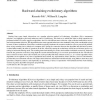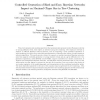106
click to vote
AI
2006
Springer
15 years 2 months ago
2006
Springer
We consider how to forget a set of atoms in a logic program. Intuitively, when a set of atoms is forgotten from a logic program, all atoms in the set should be eliminated from thi...
123
Voted
AI
2006
Springer
15 years 2 months ago
2006
Springer
We study Coalitional Resource Games (CRGs), a variation of Qualitative Coalitional Games (QCGs) in which each agent is endowed with a set of resources, and the ability of a coalit...
124
click to vote
AI
2006
Springer
15 years 2 months ago
2006
Springer
Starting from some simple observations on a popular selection method in Evolutionary Algorithms (EAs)--tournament selection--we highlight a previously-unknown source of inefficien...
148
click to vote
AI
2006
Springer
15 years 2 months ago
2006
Springer
This article presents and analyzes algorithms that systematically generate random Bayesian networks of varying difficulty levels, with respect to inference using tree clustering. ...
106
Voted
AI
2006
Springer
15 years 2 months ago
2006
Springer
Deeper searches in game-playing programs relying on the minimax principle generally produce better results. Theoretical analyses, however, suggest that in many cases minimaxing am...
113
click to vote
AI
2006
Springer
15 years 2 months ago
2006
Springer
This paper demonstrates how machine learning methods can be applied to deal with a realworld decipherment problem where very little background knowledge is available. The goal is ...
111
click to vote
AI
2006
Springer
15 years 2 months ago
2006
Springer
The Spohnian paradigm of ranking functions is in many respects like an order-of-magnitude reverse of subjective probability theory. Unlike probabilities, however, ranking function...
105
click to vote
AI
2006
Springer
15 years 2 months ago
2006
Springer
Finite-domain constraint programming has been used with great success to tackle a wide variety of combinatorial problems in industry and academia. To apply finite-domain constrain...
148
click to vote
AI
2006
Springer
15 years 2 months ago
2006
Springer
In this paper we describe a machine learning approach for acquiring a model of a robot behaviour from raw sensor data. We are interested in automating the acquisition of behaviour...
AI
2006
Springer
15 years 2 months ago
2006
Springer




